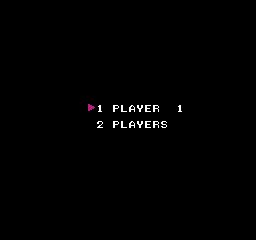If you appreciate the work done within the wiki, please consider supporting The Cutting Room Floor on Patreon. Thanks for all your support!
Toki (NES)
| Toki |
|---|
|
Also known as: JuJu Densetsu (JP)
|
| This page is rather stubbly and could use some expansion. Are you a bad enough dude to rescue this article? |
Contents
Debug Mode
The Game Genie code PEKYVYAA enables a debug mode. Besides being able to pass through enemies freely, you can select the stage you start on by pressing A on the player select screen.
Regional Differences
Title Screen
| Japan | US |
|---|---|
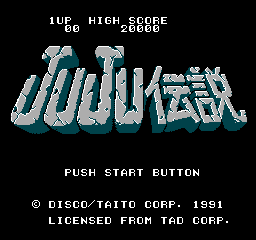 |
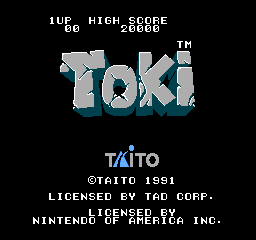 |
Due to the name change, the Japanese version features a different, larger logo on the title screen. The Taito logo was also added in the US release.
Level Intro Screen
| Japan | US |
|---|---|
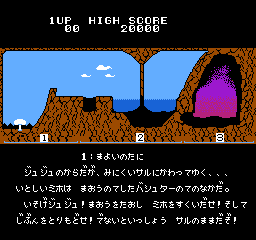 |
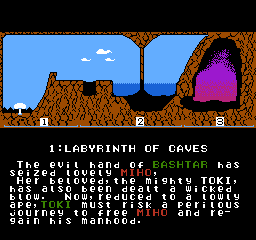 |
In the level intro screens, the map is positioned lower in the Japanese version since the required space to place the text is smaller compared to the US version. The Japanese version also shows the score counters above the map.
Gameplay differences
| Japan | US |
|---|---|
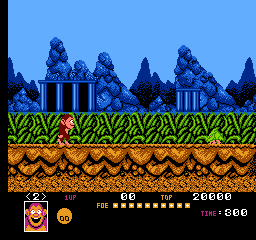 |
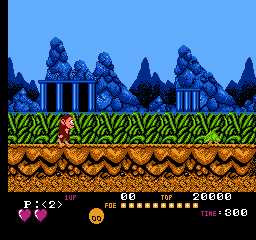 |
- In an effort to emulate the arcade game more closely, the Japanese version gives Toki only a single hit point and shows a large mugshot of him on the HUD, which is absent from the US version. Furthermore, the US version gives Toki a health system with two hit points (with opportunities to increase it up to four).
- In the US version, defeating a boss (excluding the final boss) causes three random powerups to sprout on-screen: Coins and fruit which can be found in the stages regular, and several larger items exclusive to the US version. In the Japanese version, the stage instantly ends after the boss is defeated.
The Toki series
| |
|---|---|
| Arcade | Toki |
| NES | Toki |
| Atari Lynx | Toki |
| Genesis | Toki: Going Ape Spit |
- Pages missing developer references
- Games developed by Taito
- Pages missing publisher references
- Games published by Taito
- NES games
- Pages missing date references
- Games released in 1991
- Games released in July
- Games released on July 19
- Games released in December
- Games with debugging functions
- Games with hidden level selects
- Games with regional differences
- Stubs
- Toki series
Cleanup > Pages missing date references
Cleanup > Pages missing developer references
Cleanup > Pages missing publisher references
Cleanup > Stubs
Games > Games by content > Games with debugging functions
Games > Games by content > Games with hidden level selects
Games > Games by content > Games with regional differences
Games > Games by developer
Games > Games by developer > Games developed by Square Enix > Games developed by Taito
Games > Games by platform
Games > Games by publisher
Games > Games by publisher > Games published by Square Enix > Games published by Taito
Games > Games by release date > Games released in 1991
Games > Games by release date > Games released in December
Games > Games by release date > Games released in July
Games > Games by release date > Games released in July > Games released on July 19
Games > Games by series > Toki series
The Cutting Room Floor > Unimportant Awards > NES games
